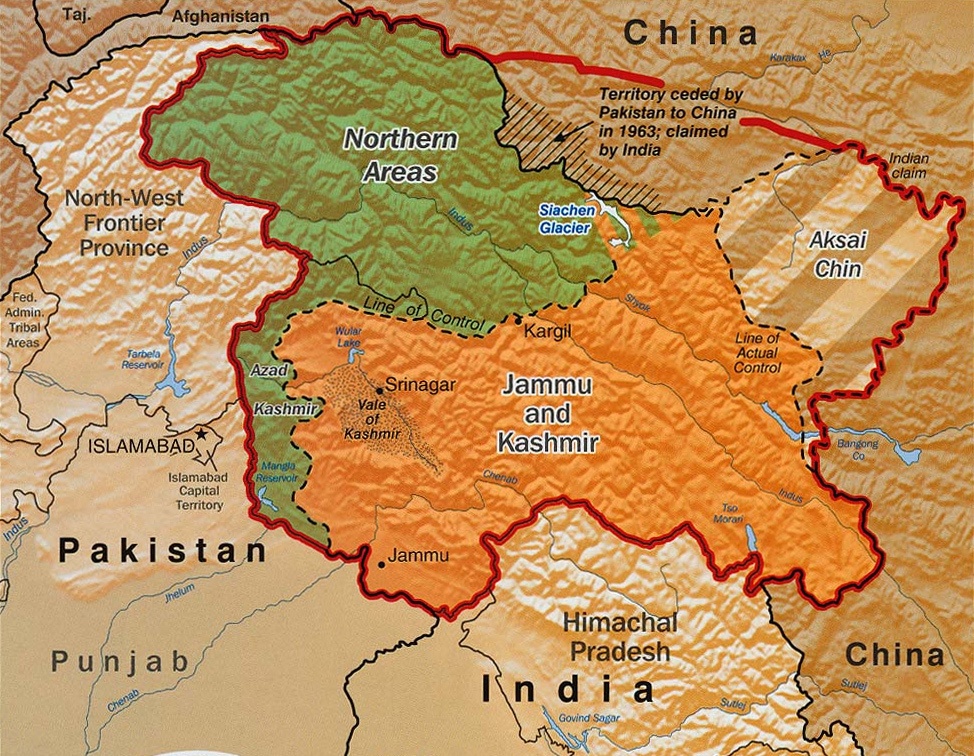
The areas shown in green are the two Pakistani-controlled areas: Gilgit–Baltistan in the north and Azad Kashmir in the south. The area shown in orange is the Indian-controlled state of Jammu and Kashmir and the diagonally-hatched area to the east is the Chinese-controlled area known as Aksai Chin – Public Domain
While I have been highly critical of the extended detentions of former heads of government, former legislators, and a former civil services officer under the Public Safety Act (PSC), I cannot forget the 200 Kashmiri men being held in jails outside the Valley.
These incarcerated Kashmiris have been detained under the Public Safety Act (PSC) as well.
It is important to condemn the impunity with which authorities have illegally detained these people, not all of whom are political activists. Have these detainees been formally charged, or are they being held on grounds of vaguely defined suspicion?
Unfortunately, a modification to the Public Safety Act in 1990 made it non-obligatory for the authorities to provide the detainee with reasons for his/her arrest.
Some of these detainees were sole bread winners of their families. The families of these young men are now derelict, with nowhere to turn. They lack the wherewithal to undertake the long journey from the Valley to Uttar Pradesh where their sons are being held. The unknown fate of their children is a constant presence in their lives, like a leaden sky whose clouds are getting lower and lower. The lack of closure in their lives makes their existence unbearable. Their stories evoke tragic destinies, unredeemed by justice.
In a democratic set-up, it is a heinous mistake to nip the political evolution of a society by belligerent and incoherent policies.
Several people in Kashmir do not have recourse either to mainstream media, or to the judicial and administrative machinery. Such people have been left with a stone-faced stoicism and do not expect any reparations from the state. Does the state give any thought to the economic and emotional rehabilitation of such people?
Has the administration of Jammu and Kashmir released official data on the number of minors detained since the revocation of the autonomous status of the former state on August 5, 2019?
Trauma brought on by political turmoil, military and militant unaccountability, and fear psychosis created by such happenings impacts people in terrible ways. How is the further militarization of Jammu and Kashmir facilitating “development”? On the contrary, developmental issues have been relegated to the background, and plurality of ideologies has been negated.
I would expect those who have been in the political arena for a long time to recognize that there is no politics without negotiation. And the ultimate negotiating authority is the populace of J & K.
Forces that have used dishonest means to achieve a political purpose cannot reduce Jammu and Kashmir to rubble.
Along with the strengthening of economic ties between the United States and India in the wake of President Trump’s visit to India, I hope the political uncertainty in Jammu and Kashmir ends.
I hope monstrous laws, which Kashmir is currently ruled by, that have crippled all political and social life in the union territory and paralyzed all progress, are repealed.
I hope laws that authorize arrests and detention, for long periods of time without trial or even without disclosing the grounds of detention, are revised.
I hope the administration of Jammu and Kashmir ceases to make free and frequent use of this law of the jungle.
I hope citizens and political workers who have been arrested for either unknown or uncorroborated reasons are released.
I hope political workers are not intimidated with the threat of implicating them in fabricated criminal cases, if they fail to support decisions made by the federal government and its appendages in J & K.
I hope civil liberties and political rights are resuscitated in the now-union territory.